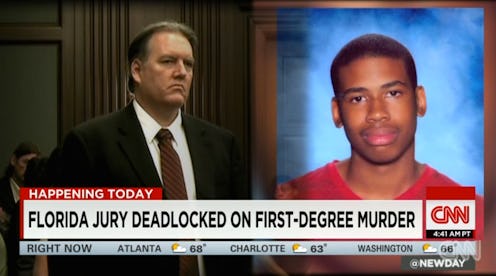News
Michael Dunn Is Being Tried For Murder, Again

If there's any national conversation that's been red-hot over the past year, it's the way the criminal justice system, and juries in particular, handle incidents of young black men being killed. In the case of Florida teen Trayvon Martin, a jury found his killer George Zimmerman not guilty by means of self-defense in 2013, but there was another case in Florida in early 2014 that deserved a similar measure of attention: Convicted killer Michael Dunn is now being retried for allegedly murdering Jordan Davis, a 17-year-old black teen whom Dunn fatally shot at a Florida gas station in November 2012. The shooting happened after Dunn told Davis to turn down the music coming from his SUV.
When the case was first at trial, it received a lot of attention for similar themes to the George Zimmerman trial, in particular the willingness to show deference to a white defendant's fears or suspicions of young black men. The basic facts of the case go like this:
- Michael Dunn became agitated while at a gas station, due to the volume of the music blaring from some teens' SUV. Dunn's fiancée, who entered the station to buy a snack, testified that Dunn mentioned he "hates that thug music," though he claimed he probably said something like "rap crap" instead.
- Dunn requested the music be turned down, but his demand wasn't met — one of the three teens riding with Davis, Tevin Thompson, testified that the slain teen turned down the music like Dunn asked, but then turned it up again when Thompson told him to.
- Here's the critical turn in the story — Dunn, the possessor of a concealed handgun permit, opened fire on the boys' SUV. He claimed during his initial trial that he saw Davis grab a shotgun inside the car, and acted out of fear for his life, shooting and killing the teen. This alleged shotgun was never found by authorities.
- Dunn was charged with three counts of attempted murder for the surviving teens, and one count of murder for Davis' killing. But when it came time to read the verdict, it turned out the jury had deadlocked on the murder charge — so, despite convicting Dunn for attempting to murder the three people who didn't die, the one who did die led to a hung jury.
In other words, you can see pretty clearly why this retrial matters so much, in spite of the fact that Dunn's attempted murder convictions could land him in jail for a functional life sentence. According to USA Today, Dunn faces anywhere from 60 to 105 years in prison for the charges he's already been convicted of, but it's still a matter of basic justice for a lot of people to see him convicted explicitly for Davis' death.
This include Davis' father, who told CNN that he didn't feel the outcome had properly recognized his son's killing:
I feel like that — we didn't get justice for Jordan. No matter what happens to Michael Dunn, whether it's a hung jury or whatever, I still have that loss. That's greater than any other verdict.
Now, Dunn will face the retrial he's been waiting several months for, and it's sure to be as hotly covered as it was the first time around. The case sparked a lot of passion, both for the allegations of racial bias on Dunn's part — he was caught comparing himself to a rape victim during a jailhouse phone call to his fiancée, as ThinkProgress detailed, and stated that while being stuck alone in a cell was bad, it was better than the alternatives.
But I guess it would be better than being in a room with them animals. ... I was in a room with three black guys.
There are essentially three possible outcomes in this case at this point. The first one, obviously the hope of Davis' friends and family, is that Dunn will be convicted of murdering the slain teen, a validation by a court of law that, no, it wasn't acceptable self-defense claim to kill him on the threat of a seemingly nonexistent shotgun.
On the other hand, the jury could determine Dunn's self-defense claim to be legitimate. The laws relating to self-defense in Florida give wide berth to anyone who can claim a reasonable fear of their life, and there's no legal requirement to try to retreat from such threats — Florida is home to one of those controversial "Stand Your Ground" laws, after all, a fact underscored throughout the George Zimmerman case.
And, of course, there's the chance that exactly the same thing will happen as last time: a deadlocked jury, and a mistrial declared. Were this to happen again, there's no way to know for sure if Davis' family would press for another attempt. According to CNN, Davis' father is eager for the drawn-out legal saga to end, at the same time as he craves a public show of justice for his son.